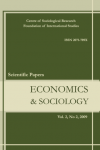MACROECONOMIC STABILITY
OF THE COUNTRY: THE NEXUS
OF INSTITUTIONAL AND
BEHAVIOURAL DIMENSIONS
MACROECONOMIC STABILITY
OF THE COUNTRY: THE NEXUS
OF INSTITUTIONAL AND
BEHAVIOURAL DIMENSIONS
Author(s): Oleksii Lyulyov, Tetyana Pimonenko, Yang Chen, Aleksy KwilinskiSubject(s): National Economy, Social development, Economic development, Socio-Economic Research
Published by: Fundacja Centrum Badań Socjologicznych
Keywords: government; stable development; economic growth; trust level; cultural diversity;
Summary/Abstract: The ongoing globalisation, recessions, andfluctuations in world development require theacceptance of timely government interventions anddecisions to save the country's macroeconomicstability. The literature analysis has confirmed a gapin research on assessing and comparingmacroeconomic stability at different levels ofdevelopment, especially in terms of studies thatconsider the behavioural (culture and trust)dimensions and the quality of institutions. This paperaimed to empirically assess how the achievement ofmacroeconomic stability depends on the quality ofinstitutions, increasing society's trust, and culturaldiversity. This study investigated post-communisteconomies among EU countries and Ukraine (as thecandidate for EU) over 2005-2020. Pearsoncorrelation, OLS and FGLS, robustness test output,GEE, and stochastic frontier model were applied toachieve the paper's aims. The findings confirmed thatcountries with high-quality of institutions had ahigher value of macroeconomic stability. In addition,social trust positively affected the relationshipbetween the quality of institutions andmacroeconomic stability. At the same time, variousnational cultural dimensions had different effects onmacroeconomic stability. The four indicators ofHofstede Insights (power distance, masculinity,uncertainty avoidance, and indulgence) had astatistically significant impact on macroeconomicstability
Journal: Economics and Sociology
- Issue Year: 16/2023
- Issue No: 4
- Page Range: 264-288
- Page Count: 25
- Language: English

